In 2020, Babajide Sanwo-Olu, governor of Lagos, announced a total ban on the operation of commercial motorcycles, better known as okada, in some LGAs in the state. The government inaugurated a squad to enforce the ban and warned that violators are liable to an imprisonment term of three years. The Lagos-Badagry expressway was among the 11 major roads where the ban was enforced. On January 2, Sanwo-Olu passed through the Lagos-Badagry expressway with his entourage while going to the Lagos State University (LASU) Ojo campus to inaugurate the Femi Gbajabiamila Conference Centre. The governor was shocked and irritated by the flagrant disregard for traffic rules. He gave an order, and his straight line of entourage shaped into a hook and cornered some okada riders plying the expressway. The trap was too sudden and effective for the okadas. Most of the riders rolled off their bikes and fled, leaving their precious means of livelihood behind. But a handful of them were arrested. According to the governor, one of them was a “useless boy” who claimed he was a soldier. The governor promised to punish the arrested offenders and make them face the full wrath of the law to create deterrence for others. But little did Sanwo-Olu know that what he had just witnessed was a thriving ecosystem of brazen traffic transgression backed and exploited by thugs, identified as “barrack boys”. As soon as the governor left, the barrack boys returned to the expressway to cash out. On April 6, this reporter visited the Iyana-Iba axis of the Lagos-Badagry expressway, where he witnessed a thriving colony of okada riders. OKADA RIDERS DEFY BAN
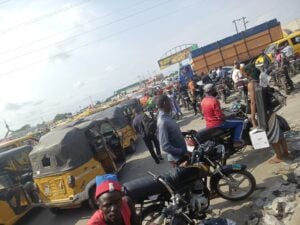
Commercial motorcycles at Iyana Iba underbridge calling on potential customers.
The
okada riders hailed potential customers for a trip to the Alakija bus stop on the other side of the expressway, with little regard for the government’s prohibition of bikes along the route. The reporter flagged down Yaro, one of the bike riders, and our price bargaining added to the noise at Iyana Iba Underbridge. “
Oya, pay N700 las las,” Yaro gave the reporter a final offer. “
I no go carry another passenger, na only you“. He kicked his bike alive, the reporter hopped on, and we zoomed off. Shortly after the journey started, Yaro’s bike crossed the kerb and headed straight into the BRT corridor along the axis, where the trip continued. “
Na so we dey pass am for here,” he replied when asked why decided to drive along the reserved path. According to the
Lagos state traffic laws, driving on the BRT corridor is a crime punishable by a fine of N20,000 for a first-time offender, six-month imprisonment or one-year community service in addition to compulsory training by the Lagos State Drivers’ Institute (LASDRI). Riding a motorcycle against traffic also comes with a penalty of N50,000, three-month imprisonment, or six-month community service. The riders openly violated these laws as they sped down the expressway, risking the lives and safety of their passengers and other road users. During the reporter’s trip with Yaro, a Federal Road Safety Corps (FRSC) patrol team was operating on the highway, but the officers seemed unbothered.
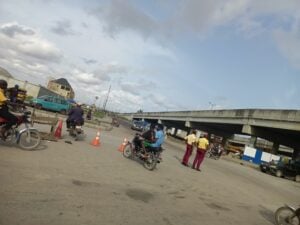
LASTMA officials turning blind eyes to transgressors of okada ban along Lagos-Badagry Expressway
A few kilometres ahead, the bike came to a screeching halt alongside others before a band of men with scary countenance. Five split on the road, barking orders at the riders. Another half-dozen men hung around the mouth of a pedestrian bridge not far away, watching. The reporter was scared by the menacing authority and the sheer number of these men. The reporter’s fear worsened after one of them—a light-skinned fellow with an air that suggested he was the group leader–walked up.
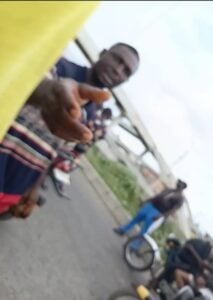
One of the “Barrack Boys” demanding money from the reporter
“
Oga, do weekend for us,” he told the reporter. The light-skinned fellow did not wait for the answer before moving to the next bike to make the same demand. Yaro told the reporter that passengers must pay before they are allowed to proceed from the spot. Failure to pay, he said, means the passenger and rider must get off the bike and walk past the gate of the Nigerian Army Cantonment, Ojo. The gate of the cantonment is located just opposite the spot where these men carry out their activities.
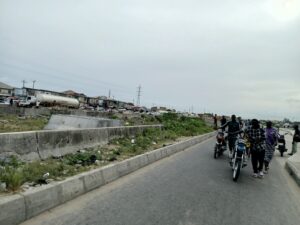
Passengers and riders trekking after the “Barrack Boys” ordered them off their bikes because they could not pay the toll.
After he refused to pay, the reporter was ordered to drop off the bike alongside Yaro and walk about 50 meters past the cantonment gate. Multiple bikes and passengers followed us as we trekked the distance before finally resuming the journey.
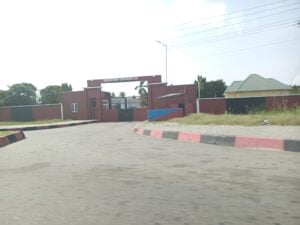
Entrance of the Nigerian Army Cantonment, Ojo, just opposite the “Barrack Boys” toll point
When asked about the toll men, Yaro simply called them “barracks boys”. He claimed the men had the backing of soldiers to collect toll fees from bike riders and passengers. The reporter also spotted a man clad in military fatigue canvassing with a group of men just a few meters from the toll point.
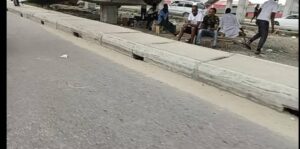
A man in military fatigue sitting and conversing just a few meters from the toll point.
Mohammed, another bike rider along the axis, called the men “soldier boys”. According to Muhammed, he pays a minimum of N200 twice — morning and night — daily as toll fees to the “barrack boys” just to pass through the route with his bike and passengers. He added that the fees paid by the riders do not cover the passengers, who would also be required to pay with each trip across the toll point. Shuaibu, another bike rider along the axis, told this reporter that he often pays between N500 and N1000 as toll fees to the “barrack boys”. He added that some riders were beaten by the men at the toll points when they refused to pay. On another trip along the route, the reporter witnessed the aggression of the “barrack boys”. They demanded a toll, and the reporter paid N200, gleefully collected by one of them. As the bike was about to exit the toll point, another member of the group lurched at the rider. He pulled the shirt of the rider with one hand, with the other holding a half-eaten mango. His bloodshot eyes were almost the colour of his brown strap bag as he queried us for attempting to ride past without payment. He did not let go of the bike rider until he was told we had “settled” the toll.
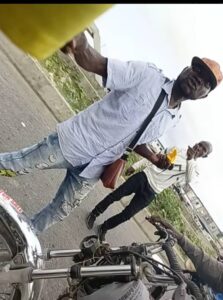
One of the “Barrack Boys” who furiously lurched at a bike rider.
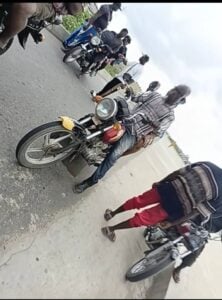
“Barrack Boys” surrounding bikes at the toll points
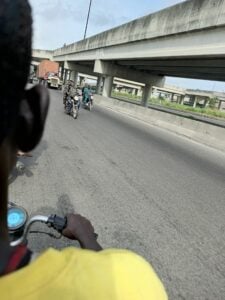
Okada riders speeding against traffic at Lagos-Badagry expressway
This happens every day along the route and it has become a usual experience for residents who pass the area and are forced to pay toll by the “barrack boys”.
ARMY, LAGOS GOVERNMENT KEEP MUM Efforts to get the official response of the Nigerian army and Lagos state government proved abortive. Olabisi Ayeni, spokesperson of the 81 division, which is in charge of Lagos and Ogun states, did not respond to calls and messages seeking his reaction to the findings in this story. Gbenga Omotosho, Lagos commissioner for information, also did not respond to calls and text messages sent to him.
free vector









No Comments to "EXPOSED: How ‘barrack boys’ levy road users flouting okada ban on Lagos highway"